Overcoming Self Doubt: 10 Powerful Steps for Lasting Success
Understanding the Cycle of Self-Doubt
Overcoming self doubt requires a clear strategy and understanding of what’s happening in your mind. If you’re looking for immediate help, here are the key steps:
- Practice self-compassion – Talk to yourself like you would a good friend
- Set positive intentions – Focus on what you want, not what you fear
- Challenge negative thoughts – Ask “Is this fact or fear?”
- Take small, consistent actions – Build confidence through tiny wins
- Seek support – Connect with others who believe in you
Self-doubt is that nagging inner voice that questions your abilities, decisions, and worth. According to research, about 70% of people experience imposter syndrome or self-doubt at some point in their lives.
When self-doubt takes hold, it creates a cycle that can feel impossible to break. You question yourself, which leads to hesitation, which leads to inaction or mistakes, which then reinforces your original doubts.
I’m Coach Mary Chege-Kamau, a Professional Certified Coach with the International Coaching Federation who has helped thousands overcome self-doubt through changeal coaching methods that address both mindset and practical action steps.
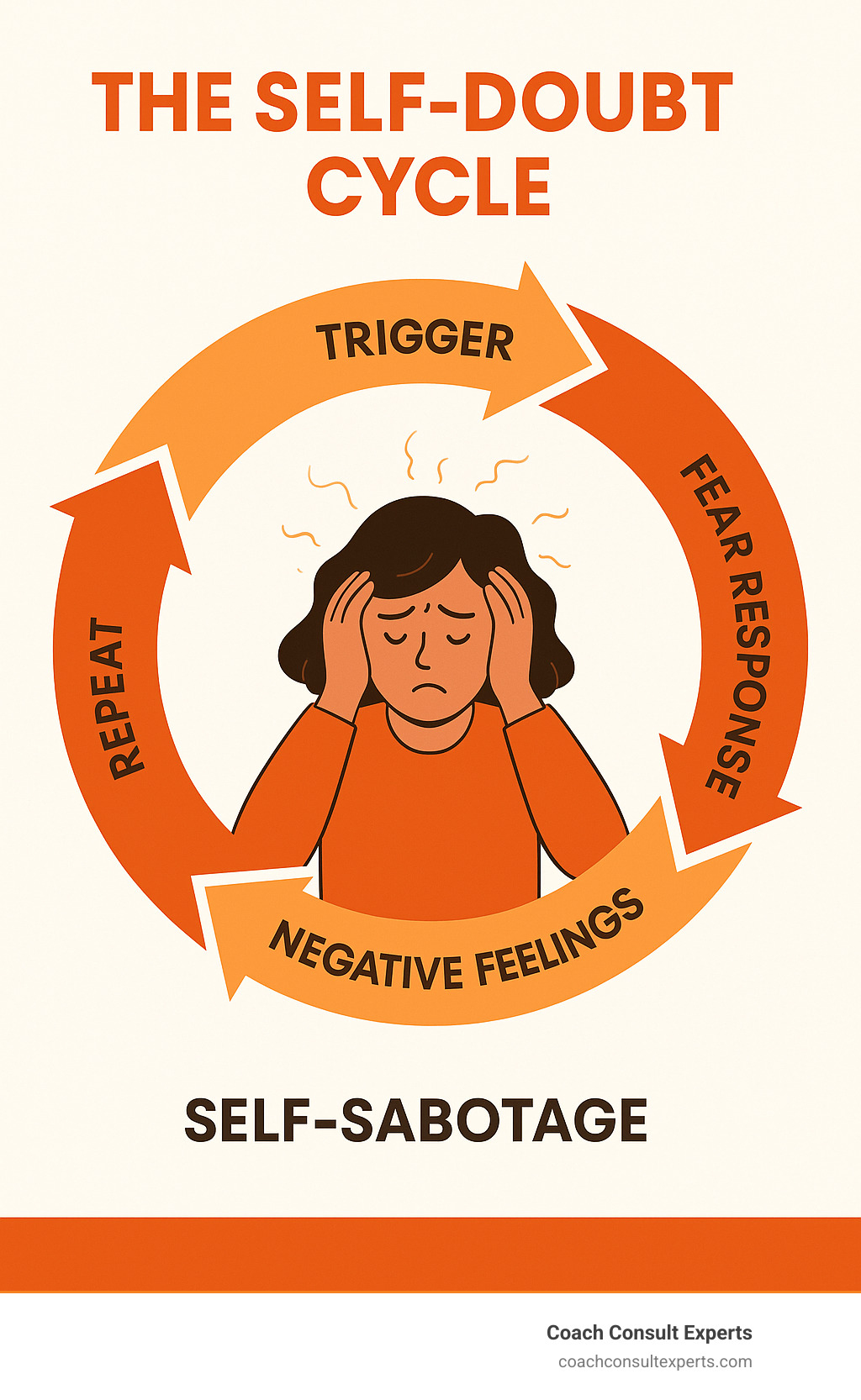
What Is Self-Doubt and Why It Shows Up
Self-doubt is that persistent inner critic that whispers “you’re not good enough” just when you need confidence most. It’s a deeper questioning of your abilities, judgment, and worthiness that can hold you back from living your fullest life.
How Self-Doubt Manifests
We all experience self-doubt differently, but there are common patterns worth recognizing:
Perfectionism often masquerades as high standards, but in reality, it’s self-doubt wearing a productivity mask.
Procrastination might feel like laziness, but it’s frequently self-doubt in disguise. When you don’t trust your abilities, putting things off feels safer than trying and potentially failing.
Decision paralysis happens when you’re so afraid of making the wrong choice that you make no choice at all.
Seeking constant reassurance from others signals you don’t trust your own judgment.
Impostor syndrome makes you feel like a fraud despite clear evidence of your competence.
The good news? Research from BetterUp shows that people who actively work on overcoming self doubt report a 29% increase in overall well-being and 31% improvement in work performance.
Root Causes of Self-Doubt
Childhood messages stick with us. When parents, teachers, or other important figures emphasized your shortcomings or set impossibly high expectations, those voices become internalized.
Past disappointments leave scars. Previous experiences with criticism, rejection, or failure create protective patterns in our thinking.

Comparison is a confidence killer, especially in our digital age. According to Lean In research, 60% of women report self-doubt at work even when fully qualified for their roles.
Your body’s fear response plays a significant role too. When facing uncertainty, your brain’s limbic system activates fight-flight-freeze reactions before conscious thought catches up.
The most empowering news? Your brain has neuroplasticity—the remarkable ability to form new neural pathways throughout your life. Scientific research on neuroplasticity confirms that with consistent practice, you can literally rewire your brain to reduce self-doubt and build confidence.
The Hidden Fear Loop: Wheel of Fear Explained
Have you ever wondered why self-doubt feels so stubborn? The answer lies in what we call the “Wheel of Fear” – a framework that explains why overcoming self doubt can feel so challenging.
This cycle moves through four distinct stages:
-
Trigger: Something happens that activates your internal alarm system.
-
Fear Response: Your brain goes into protection mode, flooding you with thoughts like “I’m not good enough” or “I’ll probably fail anyway.”
-
Core Negative Feeling: Beneath those surface thoughts lies something deeper – the raw emotional response that’s really driving everything.
-
Self-Destructive Behaviors: To avoid sitting with those painful feelings, you react with procrastination, perfectionism, or avoidance.
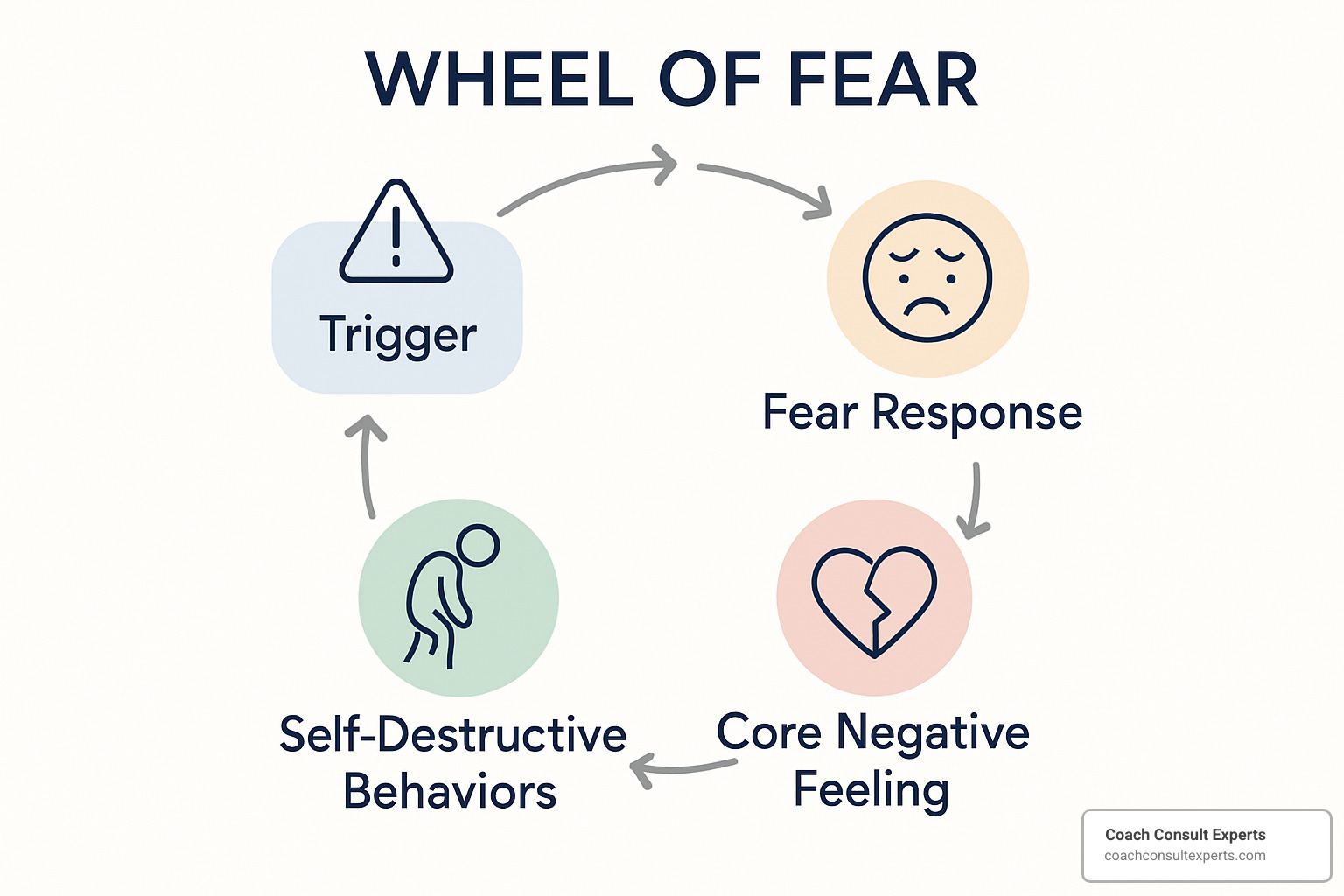
Identifying Your Core Fear
Breaking free starts with identifying what’s really driving it – your core fear. Is it fear of failure? Fear of rejection? Fear of being judged? Fear of success? Or perhaps the fear of simply not being enough?
Awareness is powerful. Research shows that intentionally practicing positive self-talk and setting clear intentions can reduce negative self-talk by up to 50%.
From Wheel of Fear to Wheel of Freedom
| Wheel of Fear | Wheel of Freedom |
|---|---|
| Trigger | Awareness |
| Fear Response | Conscious Choice |
| Core Negative Feeling | Self-Compassion |
| Self-Destructive Behaviors | Empowered Action |
The alternative to the Wheel of Fear is the Wheel of Freedom. Instead of being trapped in unconscious reactions, you can learn to recognize triggers, make conscious choices, practice self-compassion, and take empowered actions that align with your true values.
At Coach Consult Experts, our “The Power Within You” program specifically addresses these fear cycles. This change doesn’t happen overnight – but with consistent practice, you can rewire your response to fear triggers.
Overcoming Self Doubt: 10 Science-Backed Steps
Now that you understand what’s happening when self-doubt takes over, let’s explore practical, evidence-based strategies to break free from its grip.
1. Practice Self-Compassion
Would you speak to a dear friend the way you talk to yourself when you make a mistake? Research confirms that self-compassion significantly increases confidence while reducing self-doubt.
When you face a setback, try this simple shift: “This is difficult right now, and that’s okay. How can I be kind to myself in this moment?”
2. Set Clear Intentions
Instead of focusing on what you want to avoid (self-doubt), direct your energy toward what you want to create. Rather than “I need to stop doubting myself,” try “I am willing to trust my abilities and speak with confidence today.”
3. Interrupt Negative Self-Talk
When you notice self-doubt creeping in, consciously interrupt it. Say “Thank you for trying to protect me” to your fear, then pivot to “I am willing to…” statements.
4. Distinguish Between Facts and Fears
Ask yourself: “Am I making this up, or is it fact?” The research is clear—99.9% of our fearful beliefs are stories we’ve created rather than objective reality.
When doubt whispers “You’ll fail at this presentation,” challenge it by hunting for contradictory evidence.
5. Set SMART Goals
Vague aspirations breed doubt, but specific plans build confidence. Transform intimidating goals into Specific, Measurable, Achievable, Relevant, and Time-bound objectives.
6. Celebrate Small Wins
Each time you take action despite feeling doubt, you’re building your “confidence muscle.” Start a wins journal where you record daily successes, no matter how small.
7. Build a Support Network
Surround yourself with people who see your potential, especially when you can’t see it yourself. Your support network acts as an external reality check when self-doubt distorts your perception.
8. Seek Professional Coaching
A skilled coach offers objective feedback combined with unwavering belief in your potential. The right coach helps you identify blind spots and limiting patterns you might miss on your own.
9. Practice Accountability
Tell someone you trust about your goals and ask them to check in on your progress. External accountability makes it harder for self-doubt to derail your actions.
10. Accept Failure as Learning
What if failure isn’t your enemy but your teacher? Each setback contains data that brings you closer to success—if you’re willing to see it that way.

For deeper insights into building your sense of deservingness, explore our resource on Increasing Your Sense of Deserving. And if you’re ready to transform self-doubt into genuine self-compassion, our research-backed approach at Scientific research on self-compassion provides valuable guidance.
Self-Compassion: The Gateway to Overcoming Self Doubt
Self-compassion isn’t just a nice-to-have when tackling self-doubt—it’s the essential foundation. When we criticize ourselves for having doubts, we create a painful double layer of suffering that makes progress nearly impossible.
Practice Kindness to Yourself
Take a moment to notice how you talk to yourself. Would you use those same words with someone you deeply care about?
The next time you make a mistake or face a challenge that triggers your self-doubt, try this simple practice: place one hand gently over your heart, take a deep breath, and say to yourself, “This is really hard right now. I’m doing my best.” This physical touch actually triggers your parasympathetic nervous system, helping to soothe your stress response.
One client told me this practice felt “silly” at first but became her anchor during moments of intense self-doubt. After three weeks, she noticed she was bouncing back from setbacks much faster than before.
Mindfulness: Observe Without Judgment
Mindfulness gives you a superpower in overcoming self doubt—the ability to notice your thoughts without immediately being consumed by them. When self-doubt creeps in, try simply labeling it: “Ah, there’s my old friend self-doubt showing up again.”
This small shift creates breathing room between you and the thought. You begin to recognize that you are not your self-doubt—you’re the awareness watching it unfold.
Connect with Your Inner Child
Many of our deepest self-doubts were planted long ago, when we were young and vulnerable. These early messages about not being enough can drive adult behaviors in ways we don’t recognize.
Try this: The next time self-doubt floods in, visualize yourself as a child. What does that younger you need to hear? What comfort would have helped then? Offer those exact words to yourself now.
Self-compassion isn’t self-indulgence. Research consistently shows that people who practice self-compassion actually take more responsibility for their actions and are more motivated to improve than those who rely on harsh self-criticism.
Interrupt Negative Self-Talk to Continue Overcoming Self Doubt
That critical inner voice is the megaphone of self-doubt, and learning to interrupt it is like finding the volume button. When I work with clients on overcoming self doubt, I often see how transformative it can be when they first realize they can challenge that inner critic.
The Superpower Question
One of my favorite tools is the “superpower question”: “Am I making this up, or is it fact?”
This question creates an immediate pattern interrupt in your thinking. It’s like pressing pause on a movie that’s been playing in your head.
When you catch yourself thinking “I’ll definitely bomb this presentation,” stop and ask yourself this question. Look at the actual evidence. Have you successfully given presentations before? Have you prepared thoroughly? Usually, you’ll find that your fears are largely fictional stories.
The Gratitude Pivot
When self-doubt starts creeping in, try this simple technique: immediately pivot to gratitude.
I remember working with a client who would freeze before important meetings. We developed a 30-second gratitude practice where she’d quickly name three things she was thankful for in that moment.
This quick pivot works because your brain literally cannot focus on fear and appreciation simultaneously. By shifting to gratitude, you move from your brain’s threat detection system into a more balanced state.
Language Swap
The words we use shape our reality more than we realize. Making conscious language swaps can dramatically change how you approach challenges:
Instead of saying “I have to finish this project,” try “I choose to complete this project.”
Replace “I should call that client” with “I could call that client.”
When you catch yourself saying “I can’t figure this out,” swap it with “I haven’t figured this out yet.”
And perhaps my favorite swap: instead of worrying “What if I fail?” try asking “What if I succeed?”
These aren’t just semantic games—they’re practical tools for overcoming self doubt by changing the conversation happening in your mind.
Reframe Stories: Facts vs Fears
Our brains are natural storytellers, constantly weaving narratives to make sense of our experiences. When it comes to overcoming self doubt, one of the most powerful things we can do is learn to distinguish between the stories based on facts versus those fueled by our fears.
Recognize Cognitive Distortions
Cognitive distortions are those sneaky thought patterns that slip in when we’re vulnerable. Some common ones include:
All-or-nothing thinking: “If I’m not perfect, I’m a complete failure.”
Catastrophizing: “If I make this one mistake, my entire career will be ruined.”
Mind reading: “Everyone in this meeting thinks I don’t belong here.”
Overgeneralization: “I always freeze up during important presentations.”
Learning to catch these thought patterns in action is like developing a superpower. Once you can name them, they begin to lose their grip on you.
Hunt for Evidence
One of my favorite exercises with clients is the “Evidence Hunt.” When self-doubt creeps in, instead of accepting it as truth, get curious and look for facts.
For example, if you think “I’m not qualified for this project,” pause and ask yourself what evidence might contradict this belief. Maybe you’ve successfully completed similar projects in the past. Perhaps your manager specifically requested you for this task.
I remember working with a client who was convinced she would fail at leading her first major team project. When we did an evidence hunt, she realized she had actually been informally leading smaller initiatives for years with excellent results.
At Coach Consult Experts, our Igniting Your Desire program helps people identify these limiting stories that fuel self-doubt.
Overcoming self doubt isn’t about never having doubts—it’s about developing the skills to question those doubts rather than letting them dictate your choices.
Build Confidence Through Tiny Wins & SMART Goals
Building lasting confidence isn’t about making one giant leap—it’s about taking small, consistent steps that gradually rewire how you see yourself. When you’re overcoming self doubt, these tiny victories create a foundation of self-trust that grows stronger with each success.
The Power of Habit Stacking
Instead of creating an entirely new routine (which your brain might resist), simply attach a confidence-building action to something you already do daily. For example, while waiting for your coffee to brew each morning, jot down one small action you’ll take today despite any self-doubt.
This technique works because it leverages neural pathways that are already well-established in your brain, making it easier to form new positive patterns.
Track Your Progress
“What gets measured gets managed,” as the saying goes—and this is especially true when you’re building confidence. Creating a visual record of your journey provides concrete evidence that contradicts those nagging self-doubting thoughts.
Many of our clients find that keeping their tracker visible—perhaps on the refrigerator or as their phone background—serves as both motivation and a reminder of how far they’ve come.
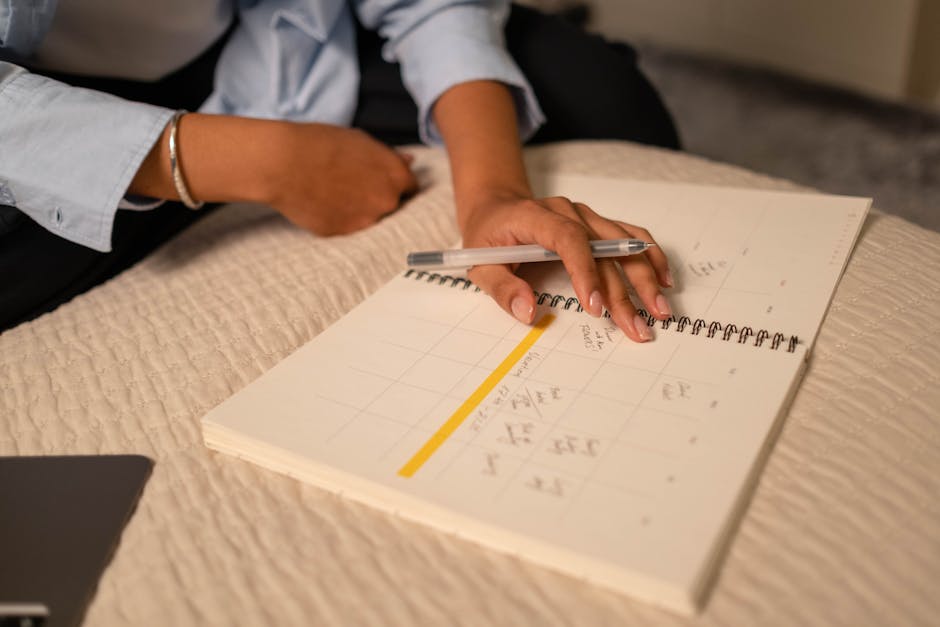
Celebrate Every Achievement
Your brain is wired to respond to celebration. Each time you acknowledge a win—even something as simple as sending that email you’ve been avoiding or speaking up in a meeting—you release dopamine, which creates a positive feedback loop.
Too often, we dismiss our small victories with thoughts like “that’s not worth celebrating” or “anyone could have done that.” Instead, try saying “I did that!” with genuine enthusiasm when you take action despite fear.
The beauty of celebration is that it transforms overcoming self doubt from a serious, heavy process into something that actually feels good.
Tools to Rewire Your Mindset and Build Lasting Confidence
Beyond the strategies we’ve discussed, specific tools can help you systematically rewire your brain for greater confidence and reduced self-doubt.
Journaling for Clarity and Confidence
Journaling helps externalize self-doubting thoughts, making them easier to examine objectively. Try these prompts:
- “What would I do if I knew I couldn’t fail?”
- “What evidence do I have that contradicts my self-doubt?”
- “What would my most confident self do in this situation?”
Spending just 10 minutes a day with these prompts can significantly reduce self-doubt over time.
Vision Boards for Focus and Motivation
Create a visual representation of your goals and the confident person you’re becoming. Include images, quotes, and affirmations that resonate with your desired mindset.
According to research, visual cues like vision boards can help cement new habits and mindsets.
Meditation for Present-Moment Awareness
Regular meditation helps you develop the skill of noticing thoughts without automatically believing or acting on them. This is particularly valuable for overcoming self doubt.
Start with just 5 minutes daily, focusing on your breath and gently returning your attention whenever your mind wanders.
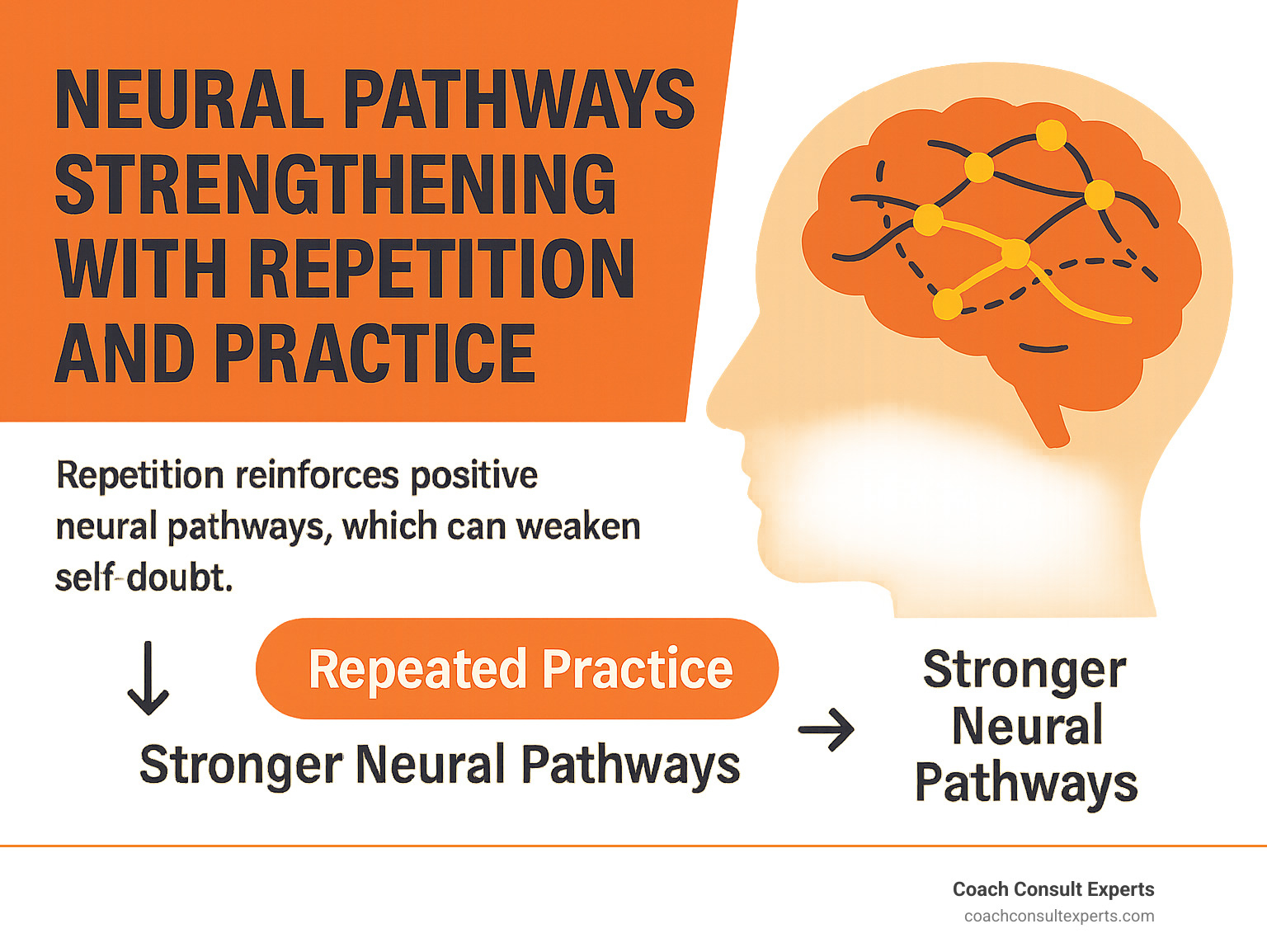
Group Coaching for Support and Accountability
At Coach Consult Experts, we’ve found that group coaching creates powerful momentum for overcoming self doubt. When you witness others facing and conquering similar challenges, it normalizes the experience and provides practical strategies you might not have considered.
Five Confidence-Building Apps
Technology can support your journey to overcome self-doubt:
- Thought Diary: Track and challenge negative thoughts
- Headspace: Guided meditations for mindfulness
- Daylio: Mood and activity tracker to identify patterns
- Fabulous: Habit-building app based on behavioral science
- ThinkUp: Create and listen to personalized affirmations
Frequently Asked Questions about Overcoming Self Doubt
How do I know if my self-doubt is normal or a problem?
Normal self-doubt feels like a gentle tap on the shoulder, reminding you to prepare thoroughly or consider different perspectives. Problematic self-doubt feels more like a wall blocking your path forward.
Your self-doubt might be becoming an issue if you notice it:
– Regularly prevents you from taking action on things that matter to you
– Creates significant emotional distress or anxiety
– Gets in the way of your relationships or career advancement
– Persists even when faced with clear evidence of your competence
Many clients initially believed their self-doubt was “just how they were” until they realized how much freedom awaited on the other side of overcoming self doubt.
Can a little self-doubt ever be useful?
Absolutely! Not all self-doubt needs to be eliminated. A healthy dose of self-questioning can be incredibly valuable.
Think of constructive self-doubt as your internal quality control system. It motivates you to prepare thoroughly before important presentations. It prevents overconfidence in high-stakes situations where careful consideration matters.
The difference between healthy and unhealthy self-doubt lies in whether it serves as a helpful advisor or a harsh dictator. The former helps you grow; the latter keeps you small.
What role does coaching play in overcoming self-doubt?
Working with a coach creates a powerful shortcut on your journey to overcoming self doubt. While self-help resources can be valuable, coaching provides unique benefits that accelerate your progress.
A skilled coach offers an objective perspective that helps you see blind spots and recognize strengths you might overlook in yourself. They’re trained to notice patterns in your thinking that you might miss because you’re too close to your own experience.
Coaching also provides built-in accountability and a safe, judgment-free space to explore the root causes of your self-doubt.
Are there gender differences in how self-doubt manifests?
While self-doubt affects people of all genders, research does suggest some differences in how it tends to manifest and be expressed.
In our coaching practice, we’ve noticed that women often raise self-doubt concerns earlier in the coaching relationship, while men might initially frame similar feelings as “strategic caution” or “analytical thinking.”
Research shows that women report self-doubt in professional settings about 60% more often than men with equivalent qualifications. The “confidence gap” is real, though it’s important to note this is a socialized difference, not an innate one.
Conclusion & Next Steps
The journey of overcoming self doubt isn’t about banishing uncertainty from your life forever. Rather, it’s about building a relationship with yourself where doubt becomes a visitor rather than a permanent resident. When you develop resilience and self-trust, those occasional doubts no longer have the power to stop you in your tracks.
I’ve seen how this work transforms lives far beyond just feeling more confident. Our clients regularly share beautiful changes that ripple through every aspect of their lives:
“I finally applied for that promotion I’ve been eyeing for years,” one client told me last month. Another shared, “I’m speaking up in meetings now, and people are actually listening!”
The benefits of this inner work show up in tangible ways:
You’ll find yourself raising your hand for challenging opportunities that once seemed terrifying. Your relationships deepen as you express yourself more authentically. Decision-making becomes clearer and faster without the fog of second-guessing. And your creativity and innovation flourish when you’re not constantly judging your own ideas.
Overcoming self doubt is more like tending a garden than building a house—it’s an ongoing practice rather than a one-time achievement. Doubt will still make appearances in your life, especially during growth periods or new challenges. The difference is that now you have the tools to recognize it, respond effectively, and keep moving forward.
At Coach Consult Experts, we specialize in helping people transform their relationship with self-doubt through our VIP coaching programs. Our approach weaves together neuroscience-based techniques with the power of supportive group dynamics, creating changes that actually stick.
If you’re ready to break free from the limitations that self-doubt has placed on your life, explore our VIP coaching options. The version of you that lives with confidence is waiting on the other side of this work.



